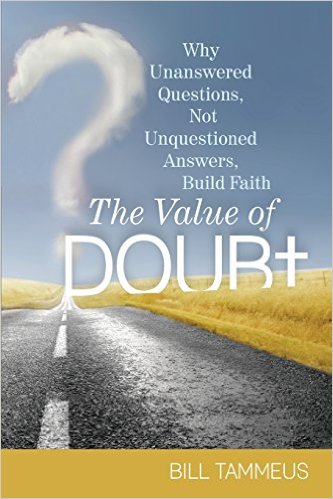The Value of Doubt: why unanswered questions, not unquestioned answers, build faith

- Suzette’s Cancer Journey - September 8, 2023
- My Black to Green Thumb - March 15, 2023
- Suzette and her three husbands by Suzette Standring - March 4, 2023
Doubt. It’s a key ingredient to faith. If you don’t question, you don’t care. A new book helped me to examine what I believe and why. The Value of Doubt: why unanswered questions, not unquestioned answers, build faith, is written by Bill Tammeus, a veteran journalist and award-winning religion writer. (Skylight Paths Publishing, September 2016, $16.99)
Athough written from a Christian perspective, the book is about the universal experience of spiritual doubt. Those times of tragedy where one wonders where is God? What can be learned from struggles, suffering and unanswered prayers. Or confusion about whether The Word is literal or metaphorical.
Among believers, a dialogue about doubt is hard to have for fear of criticism, or showing weakness, or even causing others to stumble. (My fear is a playback of platitudes.)
Tammeus writes the opposite of faith is not doubt; rather the opposite of faith is certitude. The Value of Doubt is a conversation in chapters, full of gentleness and insight, which veers the reader back to a key component of faith: trust.
Trust in the Living Christ, as Tammeus describes, brings a drastic discipleship that is a terrible, wonderful, frightening, awesome, unnerving, satisfying experience that no one does well. Trust in God cannot be fully explained or quantified to others, yet faith empowers one to seek good in the face of evil. Trust in God allows the miracle of hope when many believe there is none.
What does this spiritual trust look like in daily life? You have to have own your own answers.
The Value of Doubt is an easy read with guidance on profoundly difficult questions, such as why are we so afraid of uncertainty? Are we saved by faith or works? Can we really have faith in a faithless age? What if we fail to take our children’s faith questions seriously? Does it help to compare religions? Is the kingdome of heaven for now or later? What can we do when Radio God goes off the air? Why is the cross so central? What is mysticism’s role in faith? Are 9-1-1 prayers for help the most genuine kind?
If you have answers, what are they based on? The Value of Doubt ends each chapter with “Let’s Talk About This,” and poses questions, such as how do you define hope in a religious sense? Is it merely optimism? Or is it something deeper? If it’s deeper, how do you expain the difference between hope and optimism?
Through the chapters, I admit difficulty answering many personal questions, thus realizing a need to explore my own spiritual terrain. Do I own my faith beliefs, or are they assumed from childhood or culture?
This I know. God’s purpose is perfect and higher than my own understanding, and deepening divine trust brings meaning to my life.
However, it’s not about lockstep dogma because then it’s only zealotry. I question because I care. The Value of Doubt bestows maturity for the soul.